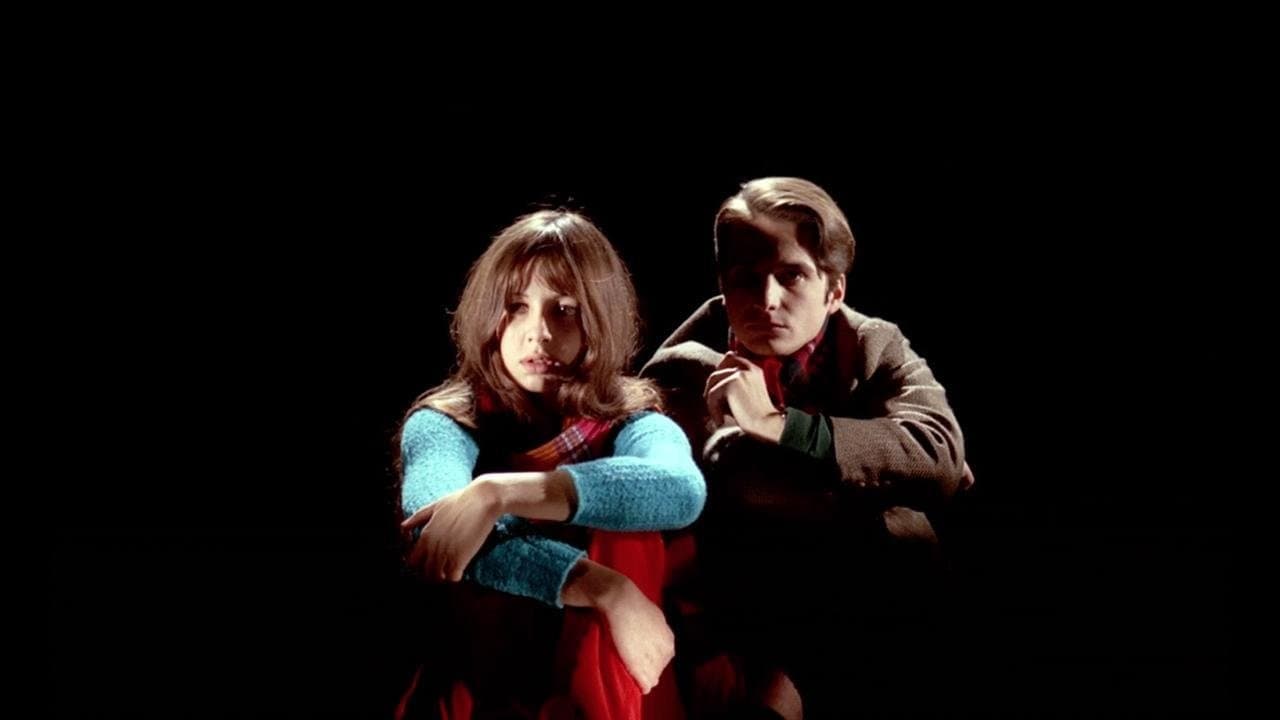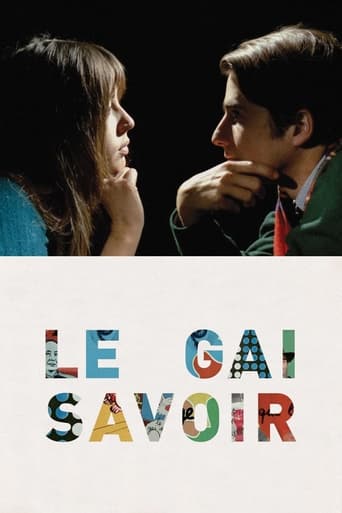Interesteg
What makes it different from others?
SmugKitZine
Tied for the best movie I have ever seen
Softwing
Most undeservingly overhyped movie of all time??
Ogosmith
Each character in this movie — down to the smallest one — is an individual rather than a type, prone to spontaneous changes of mood and sometimes amusing outbursts of pettiness or ill humor.
MisterWhiplash
At one point in this cinematic essay (as someone close put it, not really a real storyteller Godard is here but an essayist with camera and sound), some still images pop up with Che Guevara speaking (I think it's Che), and it says that (to paraphrase) in order to be a true revolutionary one must love. I wonder how much love Godard really has to offer, or can really share through his film-making in the case of "The Joy of Learning" or Le Gai savoir. His film here, a capstone of his late 1960s work that started amazingly (La Chinoise and especially Week End with Sympathy for the Devil thrown in the mix) and ended with this, is cold and analytical and sometimes put together in such a way that I would need a professor in an advanced film and politics class to really get everything across in a class discussion. This is no longer a Godard who can communicate philosophical and poetic and political dialog through the means of cinematic entertainment and "CINEMA" (in caps and quotes), but an anarchist out to f*** with time and space and language... and only sometimes succeeding in my estimation.This doesn't mean that for some intellectuals or just those tuned into the socialist/Maoist revolutionary aesthetic may not have some enjoyment or tickling of the intellect here. Indeed there are some moments that even stick out amid the whole jambalaya of discourse and narration and non-sensible/incredulously self-indulgent diatribes by the two characters. But I was strangely more intrigued by the visual pattern more than the actual dialog and political ideas, wherein the two characters are placed amid a black background, minimal but striking and provocative lighting set-ups, and spliced-in still images of newspaper clippings and communist propaganda with a car's view of driving around a French city. It may be the strongest criticism of all that I connected more (and was wondering what his thinking was) to Godard as a director and editor than as a "screenwriter". So much of what's in here is only interesting in small bits and pieces as far as information goes, and has been presented better, more audaciously in other pictures (and with less satirical bite and bile than La Chinoise, possibly his masterpiece of political cinema), and I'm left with wondering how he did this or that or what his thinking was doing it then the actual ideas.But that's just me, your 'love most 60's Godard, usually bored or perplexed by everything after' movie-buff.
chillroom-1
It has been almost twenty five years since I've seen this -- I saw it a couple times in the early 80s and I've never seen it available on tape or disk -- but I found it to be one of the most enjoyable lesson films from Godard. I though it was beautiful to look at, and quite funny in parts, and easy to follow. It IS extremely didactic -- but as the title says, there is JOY in learning. It's popping up in a Godard festival running at the Hammer Museum in June, on a double bill with Weekend, and I intend to check it out again. If I don't like it this time, I'll write again -- but I remember just totally digging this movie. The other writer here says that he didn't go to a Godard film for ten years he so disliked this -- but in my memory it was so joyous i wanted to see it again and again. hey -- maybe we're both right (or wrong).
fred3f
This film is one of Godard's most didactic and least cinematic. It could easily have been a play. Taking place on a bare sound stage, the characters are meant to seem detached from the distractions of the world. This is supposed to allow them to dwell completely in the world of ideas and come to terms with the essence of revolution. But oddly this device seems to work against Goddard. Istead of creating an atmosphere of purity and lack of compromise, it seems as if they have detached themselves from reality and are completely wrapped up in themselves. One gets the idea that their thoughts are overblown to the point of becoming egotistical. Goddard is trying to show two people willing to go to the limits of their ideas. It is an interesting concept, but long after the point is made, he continues to make it to the point of tedium. Where Goddard tries to be an iconoclast, he only achieves a very painful boredom. It is an experiment that didn't work. The concept of the film sounds good but in practice it doesn't come across. I think this film is only for the hard core Goddard fan, or someone who so strongly agrees with his social-political view, that any statement of them is reassuring and pleasant. Unless you are one or the other, proceed at your own risk.I saw this when it came out in the 60's at a film fest in NYC at Lincoln Center. I was a big fan of Goddard at the time, but this film changed that. I didn't see another Goddard film for 10 years. I have gotten back to enjoying his films, but I would never revisit this one.
carll-2
One rather confusing film. Apparently deliberately so. I enjoyed it thoroughly though.Some of the themes seemed to be:May 68The inability to get rid of bourgeois societySexuality - as something that brings together but rips apartLanguage KnowledgeAs usually with Godard it's also an statement about film - and in this case more than usually. It ends with Godards voice-over over a completely black screen saying something like that this is not the film that should be made, but that all films that will be made should have something that is this film.

